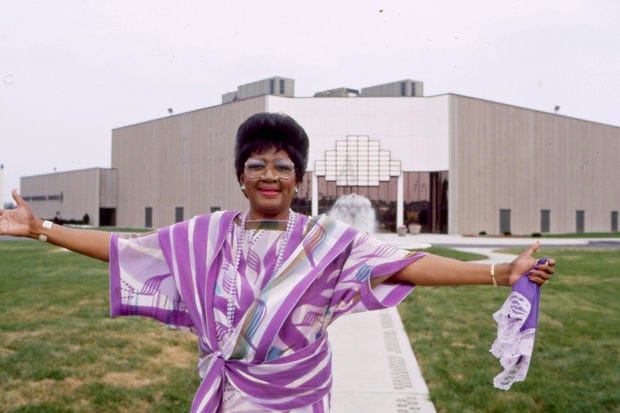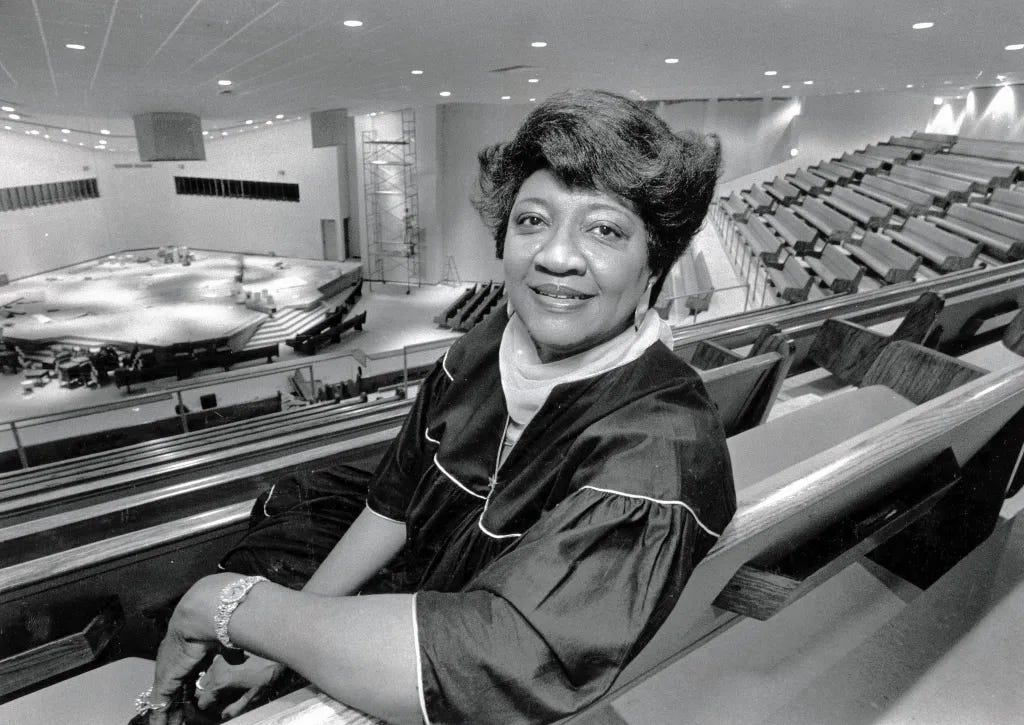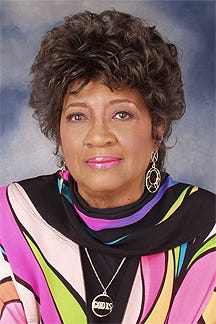You Are Not Broken: The Radical Gospel of Rev. Johnnie Colemon
From Unity’s segregated classrooms to a 4,000-seat sanctuary, she built a new kind of faith for a new kind of Black power.
As I reflect on shifts in Catholic spiritual life with leadership from Chicago, I’m reminded of the woman who introduced me to The Power of Positive Thinking: the Reverend Johnnie Colemon. During her life, her Christ Universal Temple was the largest church congregation in Chicago and the largest church in the world headed by a Black woman. Hers was a megachurch before that was a thing.
Johnnie Colemon was the first person I ever saw standing behind a pulpit, and for years I didn’t realize how unusual that was. When I hear preaching (as popularized in the Black church) even now, I’m a bit confused because for so long the only preacher (as opposed to a Catholic priest) I knew was Johnnie Colemon, a woman. At six feet tall, with flowing gowns that were a cross between choir robes, muumuus, and evening gowns, she led thousands of Black folks to their place in the middle class.
“Change your thoughts and change your life.” Rev. Dr. Johnnie Colemon
I’m a Catholic kid from Chicago. I was raised partly by priests (Jesuits) and nuns (Adrian Dominicans). But spiritually and emotionally in many ways, I’m a Johnnie Colemon baby as well as a Catholic schoolboy. I grew up around Christ Universal Temple, or CUT, on the South Side. For years, it was a staple of the Chatham neighborhood. My mother joined in 1978 and stayed through the early 2000s, serving as an usher. She wore white gloves and the church-issued polyester uniforms, which changed colors every month to match the symbolic ushers jokingly called "Hot Esther."
My mother serving as an usher was a boon for me because she got into all the special church events such as: Denyce Graves with the Chicago Symphony Orchestra, The Stellar Awards (Gospel), and the funeral of Chicago Mayor Harold Washington. The best in entertainment, culture, and politics spoke or sang from Johnnie’s pulpit. I distinctly remember Norman Vincent Peale, the author of The Power of Positive Thinking, visiting on multiple occasions. Peale is now known for being Trump’s pastor.
I wasn’t the only young boy whose mama attended C.U.T. Donda West took her son Kanye to hear Johnnie Colemon. It’s not hard for me to understand now how Johnnie Colemon took in women like Donda West and Dorothy Glinton. My mother was used to working hard without recognition. She spent decades at Ford Motor Company, in a factory full of men who quite literally told her she didn’t belong. My godmother, Jackie Jackson, faced similar battles. She’d been the prom queen and valedictorian at DuSable in the 1950s. She became the first Black person and woman engineer at GTE. Their other friend, Bobbie Catherine, was one of the first female Chicago Police Officers. They moved through worlds that didn’t easily accommodate their Blackness or their womanhood. CUT became their refuge—a sanctuary that told them they didn’t just belong, they mattered profoundly.
Every Sunday, thousands of sharply dressed, determined Black folks packed CUT’s vast sanctuary. They believed deeply in a different kind of gospel: one that said the Kingdom of Heaven wasn’t something you earned in the afterlife, but something you claimed here and now.
And every Sunday, Rev. Colemon stood at the pulpit and proclaimed: "You are the thinker who thinks the thought that makes the thing."
Johnnie Colemon’s core message was simple, but radical: You are not broken, and God is not mad at you. She taught that the divine spark lived within each of us, and that our thoughts had the power to shape our lives. At CUT, there was no begging God for scraps. Instead, Johnnie Colemon insisted that we were heirs to the kingdom, not someday, but now. “It is God’s good pleasure to give me the kingdom.” She quoted scripture, but also philosophers, psychologists, and poets.

Johnnie Colemon was always a polarizing figure, in part because she rejected so much of Black church orthodoxy. She was an adherent to a form of the prosperity gospel. She lived in a mansion in Chicago’s Kenwood neighborhood and attended church in her own stretch limousine. She scoffed at talk of poverty, which she dismissed as a lack of consciousness. For Colemon, race and poverty could be surmounted with belief—real belief—required discipline. There was more than a whiff of respectability politics and wishful thinking in her teaching. But more than anything, she demanded something rare: You control your thoughts, which shape your actions, which shape your world.
Hearing that as a kid felt powerful, even revolutionary. It wasn’t just preaching—it was teaching. And Colemon wasn’t just a preacher. She was a builder.
Sidebar: Three Voices of Black Abundance Theology
Reverend Ike
“I don’t want pie in the sky when I die. I want cash in the stash while I dash.”
One of the first national Black televangelists, Rev. Ike blended faith with flair. He preached financial empowerment in silk suits and drove Rolls-Royces. He was a pop icon of Black prosperity.
Father Divine
“I am the light of this world. I have come to bring you peace, joy, and life everlasting.”
A Depression-era preacher, Father Divine created the Peace Mission movement, offering food, shelter, and a radical gospel of dignity and divine presence in every human being.
Reverend Johnnie Colemon
“You are the thinker who thinks the thought that makes the thing.”
Colemon rejected suffering as sacred and poverty as holy. She preached a gospel of worthiness and built institutions to put that theology into action.
Johnnie Colemon was born in 1920 in segregated Columbus, Mississippi. Just five years earlier, Cordelia Stevenson had been lynched by a white mob with no consequences. That was the world Colemon entered. Her father ran a grocery store; her mother, Lula Parker, taught school. Colemon graduated valedictorian, played basketball, and later earned a degree from Wiley College. She began her career as a teacher, first in Mississippi and then in the Chicago Public Schools.
In 1952, she was diagnosed with a life-threatening illness and given just months to live. She rejected that diagnosis. Her search for healing led her to the Unity School of Christianity in Missouri. Unity taught positive thinking and spiritual oneness—very different from the fire-and-brimstone tradition of the Black church. Colemon packed up and moved to Missouri to study.
“You’ve got a big God, waiting to supply you with as much as you can hold. Expand your mind and think big!” Johnnie Colemon
But when she arrived, she found that Unity's practice didn’t match its message. She was barred from living on campus because she was Black and had to commute 15 miles daily from a segregated YWCA. One day, in the middle of a rainstorm, her car broke down. She walked for miles, soaking wet, and broke down in class.
“I can’t take it anymore,” she told her classmates. “I’m done.”
They petitioned the administration. Unity relented and offered her a rundown groundskeeper’s cottage. They thought she’d refuse.
“It was not a nice cottage,” she said later. “They expected me to say no. I said, ‘Fine. Take me to it.’”
That night, Colemon made a vow: no one in her ministry would ever feel the humiliation she had. She would build a church where worthiness was the foundation.
In 1956, she graduated as one of the first Black Unity ministers and returned to Chicago. She started small—hosting prayer circles around her dining room table. Those circles grew into Christ Unity Temple and eventually Christ Universal Temple, a 100-acre campus with a 4,000-seat sanctuary.
By the 1980s, CUT was more than a church. It was a movement. It hosted performances by Kathleen Battle, Della Reese, the Barrett Sisters. The Stellar Awards were there before they were on TV. Colemon’s pulpit welcomed names like Robert Schuller, Les Brown, Zig Ziglar, and Marianne Williamson, many before they became famous.
And yes, Reverend Ike preached there too. His showmanship packed the place. Rolls-Royce parked out front. Flashy jewelry. Catchphrases like, “You can’t lose with the stuff I use.” But beneath the flash was the same gospel: poverty is not holy. God did not glorify Black suffering.
Colemon shared that belief, but she didn’t wear it like velvet. She institutionalized it. If Father Divine built community and Ike built charisma, Colemon built structure. CUT was a system. A practice. A place where ambition, Blackness, and spiritual power weren’t in conflict.
Eventually, Unity couldn’t contain her vision. Even as its first Black president, she felt its limits. Gospel music was frowned upon. Black culture was politely excluded. So she left.
In 1974, she founded the Universal Foundation for Better Living. It spread across the U.S., Canada, the Caribbean, and South America. She founded the Johnnie Colemon Institute to train ministers, and later the Johnnie Colemon Theological Seminary.
She hosted the funeral of Harold Washington, Chicago’s first Black mayor. She welcomed a young Barack Obama to her pulpit—twice.
Today, I think about the 92 percent of Black women. What would Johnnie Colemon tell them? Probably something like: “You can’t change the world until you change your mind.” That or one of my favorites: “I will not let anyone upset the calm peace of my soul.” Think of all the cussing outs and butt whoopings she prevented with that phrase!
Johnnie Colemon’s greatest sermon wasn’t something she said. It was who she was and what she built.
When the doors were closed, she didn’t wait for someone to open them. She built her own sanctuary.
This is the moment when the choir, The Christ Universal Temple Ensemble would have stood and sing:
“Except the Lord build the house, they labour in vain that build it: except the Lord keep the city, the watchman waketh but in vain.”






